My Jade Plant Won’t Bloom – Tips On Getting A Jade Plant To Bloom
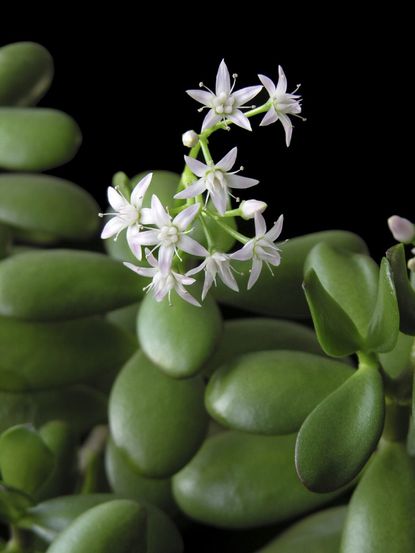

Jade plants are common houseplants that even the most novice of gardeners can grow successfully. Does a jade plant bloom? Getting a jade plant to bloom requires mimicking its native growing conditions. Lack of water, cool nights, and bright days encourage the plant to form buds and finally flowers. It's a bit of a trick, but you can fool your plant into producing pretty little starry white to pink flowers in spring. Read on to learn more.
Does a Jade Plant Bloom?
Jade plants are primarily known for their thick, glossy, succulent leaf pads. There are many types of jade but the most familiar houseplants are Crassula ovata and Crassula argentea. These succulents reproduce by vegetative means but can also flower and produce seed.
We often hear, "my jade plant won't bloom," and strive to provide information on what may cause a jade plant not flowering and how to promote blooms in reluctant plants. Jade plants grow for many years without blooming. Even in their native habitat, the plants need to be very mature before they form flowers.
Among the many jade plant flowering requirements is an arid ambient environment. Interior conditions are often too humid for the plant to form buds. Getting a jade plant to bloom will require you to move it to a dry location, withhold water, and expose it to cooler nighttime temperatures.
Of course, your plant should be an older species for blooming or you will still not find a single flower. Given the right setting and environment, a jade plant not flowering may simply be that it is not old enough to reproduce yet.
Getting a Jade Plant to Bloom
All plants need the same environment they would experience naturally to promote flowering and fruiting. Some require a dormancy period, some a photoperiod, and others extreme environmental conditions. Jade plant flowering requirements are a combination of all three. The plant doesn't exactly enter dormancy but it does require a rest period before buds form. As the days become shorter, reduce watering and do not fertilize.
Keep the plant in an area of 60 degrees F. (12 C.) during fall but protect it from any freezing. Blossoms should start to form around the shortest days of the year and bloom in late winter to early spring. These starry little flowers are produced in clusters at the tips of branches and are short lived. Once the flowers fade and the stalk becomes brown, you can cut off the flowering stem. Begin to increase water and temperature as the spring progresses.
Gardening tips, videos, info and more delivered right to your inbox!
Sign up for the Gardening Know How newsletter today and receive a free download of our most popular eBook "How to Grow Delicious Tomatoes."
In summer, move the plant outdoors gradually to an area with some protection from searing sun rays, but where it is bright for most of the day. Water when the surface of the soil is dry. Jade plants like to be crowded, so they rarely need repotting to a larger container but they do need new soil every three years.
Repot after the flowers have bloomed and at least a month before you move the plant outdoors for summer. Use a good cactus mixture for plants left indoors but add a bit of humus-rich soil to plants that are taken outside.
In spring to late summer, fertilize with a diluted balanced liquid fertilizer monthly. Don't expect annual blooms, however, as the plant needs time to store adequate energy for this infrequent floral spectacle.

Bonnie Grant is a professional landscaper with a Certification in Urban Gardening. She has been gardening and writing for 15 years. A former professional chef, she has a passion for edible landscaping.
-
 "My Worst Mistake" – Gardeners Share 10 Hard-Learned Lessons
"My Worst Mistake" – Gardeners Share 10 Hard-Learned LessonsGardeners never stop learning, and sometimes our mistakes are the best teachers. But why not save time and heartache by learning from other gardeners' failures?
By Melanie Griffiths
-
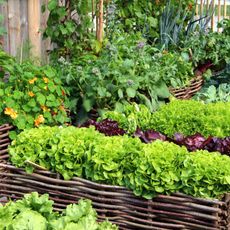 Crops for Urban Growing: 8 Edible Plants For Urban Gardens
Crops for Urban Growing: 8 Edible Plants For Urban GardensUrban edible gardening lets your yard do double duty of beauty and practicality. Have fun combining edible plants with ornamentals.
By Teo Spengler
-
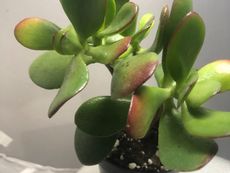 Jade Plant Turning Red – Reasons For A Jade Going Red
Jade Plant Turning Red – Reasons For A Jade Going RedWhat does it mean when a jade has red tips on the leaves? Disease, cultivation, insects, and more might be the cause. Read on for more.
By Bonnie L. Grant
-
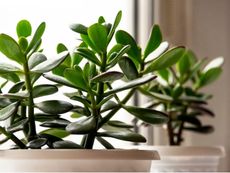 Jade Plant Looks Wrinkled – Reasons For Wrinkled Jade Leaves
Jade Plant Looks Wrinkled – Reasons For Wrinkled Jade LeavesIf you notice wrinkled jade leaves, it’s the plant’s way of telling you that something isn’t quite right. Click here for tips on fixing a wrinkly jade plant.
By Mary H. Dyer
-
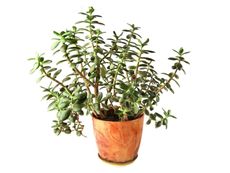 Leggy Jade Plant Care – Pruning A Leggy Jade Plant
Leggy Jade Plant Care – Pruning A Leggy Jade PlantIf your jade plant is getting leggy, don’t stress. It can easily be fixed. Find tips to help a leggy jade plant in this article.
By Raffaele Di Lallo
-
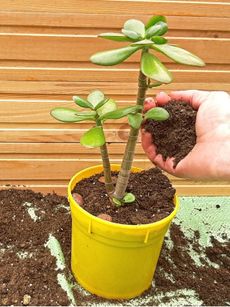 Repotting Jade Plants: Learn How To Repot A Jade Plant
Repotting Jade Plants: Learn How To Repot A Jade PlantIf your jade plant seems to be outgrowing its container, it may be time to for repotting. Click this article for tips on getting it done.
By Becca Badgett
-
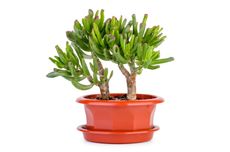 Gollum Jade Care – Information About Gollum Jade Crassula Plants
Gollum Jade Care – Information About Gollum Jade Crassula PlantsGollum jade succulents are a favorite winter houseplant that may go outside in spring. Similar to its larger cousin ET’s fingers, this jade also has long tubular leaves that curl inward and are tipped in red. If you’re looking for something fun and easy, click here to learn more.
By Becca Badgett
-
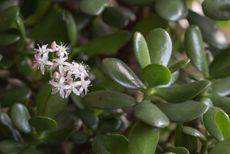 Jade In The Garden: Can You Grow Jade Outdoors
Jade In The Garden: Can You Grow Jade OutdoorsWhen most of us think of jade plants, we think of beautiful potted bonsai-like specimens. However, in parts of California, Arizona and other arid warm regions, jade is a popular choice for hedge plants. Click here for more information on growing jade outside.
By Darcy Larum
-
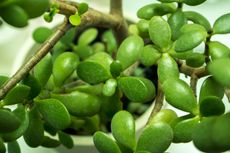 Jade Insect Pests: Learn About Common Pests Of Jade Plants
Jade Insect Pests: Learn About Common Pests Of Jade PlantsJade plants, or Crassula ovata, are popular houseplants. Generally easy-care, low maintenance plants, there are a few specific jade plant pests that can damage and even kill them if not controlled. Click here for more information on pests of jade plants.
By Darcy Larum
-
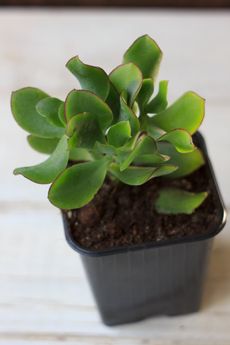 Ripple Jade Plant Info: Caring For Ripple Jade Plants
Ripple Jade Plant Info: Caring For Ripple Jade PlantsIf you’re a fan of jade plants, then ripple jade is one that’s certain to capture attention. Compact, rounded heads atop sturdy branches give the plant a bonsai type appeal. Its bluish leaves are twisted and erect, sometimes with purple edging. Learn more here.
By Becca Badgett